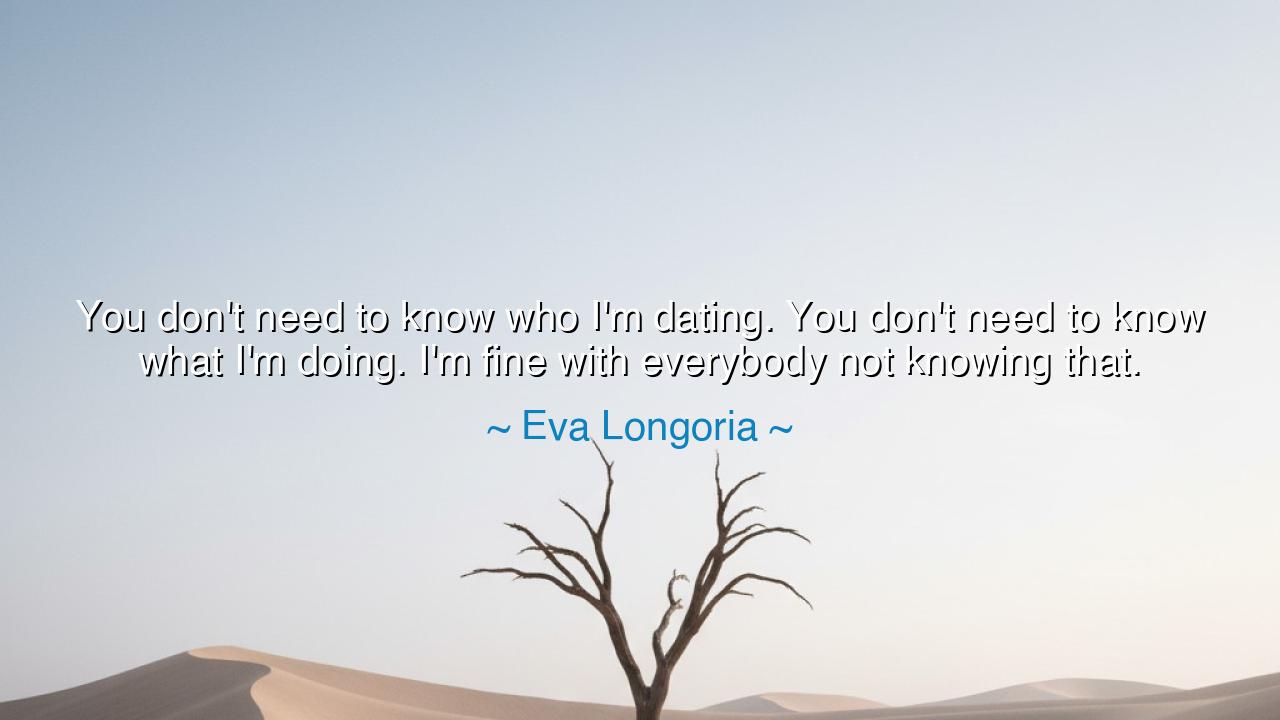
You don't need to know who I'm dating. You don't need to know
You don't need to know who I'm dating. You don't need to know what I'm doing. I'm fine with everybody not knowing that.






In the utterance of Eva Longoria—“You don’t need to know who I’m dating. You don’t need to know what I’m doing. I’m fine with everybody not knowing that.”—we hear the steady gong of privacy, a bell struck against the fever of spectacle. This is not disdain for others; it is the ancient right to an inner life, the quiet court where the soul convenes with itself. Her words remind us that a person is not a public square but a house with doors and thresholds; that dignity resides in chosen boundaries, not in endless display. To say “I’m fine” is to enthrone self-stewardship above the crowd’s curiosity—an old wisdom walking in modern shoes.
The ancients kept sanctums. Temples had outer courts for many feet and inner rooms where only the consecrated could stand. So too the human heart: there is the piazza where friendly talk may roam, and there is the holy of holies where the flame is tended. Longoria’s sentence, plain as bread, revives this architecture. “You don’t need to know” is not a wall of arrogance; it is a gate of purpose. It says: what I tend in secret must first be strong enough to weather the wind. Dating, work, and the weaving of daily choices—these are seedlings that need shade before sun.
Consider the art of listening to one’s own life. The marketplace culture shouts, “Announce!” but the mature soul learns the counter-virtue, “Withhold until ripe.” A river does not publish every ripple; it flows, it gathers, it becomes. Longoria’s emphasis on doing without announcing, loving without parading, is a discipline of ripening. Let affection find its legs before you parade it; let a plan fill its lungs before it sings. The ancients called this prudence, the mother of timing.
History bows to such hidden strength. Think of Emily Dickinson, who kept her poetry folded like linen in quiet drawers. The town did not know the breadth of her inner weather; she did not live-stream the storm. She wrote for the lamp and the page, stewarding the voltage of her heart. Only after her days did the world learn how immense her unseen gardens were. This is a high example of “I’m fine with not knowing”; her measure was not applause but alignment. She teaches us that the private forge can shape steel no public furnace could temper.
A humbler, modern story: a young doctor, Le, working night shifts, chose not to post about his dating or his losses. Colleagues joked he was “mysterious.” In truth, he kept a circle of three: a grandmother, a friend, a mentor. In that small harbor he repaired his nets—grief over a patient, hope over a scholarship, the tremor of a new love. When storms came—an accusation disproved, a breakup survived—his life did not shatter on the rocks of public comment. He had trained in the art of the unseen. Later, when he married and changed specialties, he shared the news not as a plea for validation but as a gift already whole. Boundaries had been his scaffolding; privacy, his shield and sanctuary.
Let us be clear: secrecy that hides harm is not wisdom. But privacy that protects tenderness while it learns to stand is mercy. To declare “You don’t need to know” is to honor consent: what is mine to share, I will share; what involves another’s heart, I will guard. In a world that confuses visibility with value, this is quiet heroism. It rescues love from performance and work from premature judgment. It keeps the ember bright, so that when it flames, it warms rather than burns.
What, then, shall we do? First, set boundaries by design, not by accident: decide in advance which rooms of your life are public, which are shared, and which are sacred. Second, practice the Sabbath of silence: choose hours or days when nothing personal is posted, and your attention returns to breath, craft, and the one or two souls who hold your trust. Third, honor the consent of others: ask before telling stories that are not solely yours. Fourth, keep a private ledger of growth—journal the doing you do not announce, the kindnesses no one sees. Let your worth be measured by alignment, not applause.
In this way, Longoria’s statement becomes a blessing for our age: may you be fine with not being seen by all; may you be luminous to the few who matter; may your dating, your doing, your becoming ripen in the shelter of chosen privacy. And when, in season, you speak, let it be from fullness, not from hunger; from the interior temple, not the anxious square. For the soul that learns to say “You don’t need to know” has already remembered who is keeper of the keys—and that remembrance is freedom.






AAdministratorAdministrator
Welcome, honored guests. Please leave a comment, we will respond soon